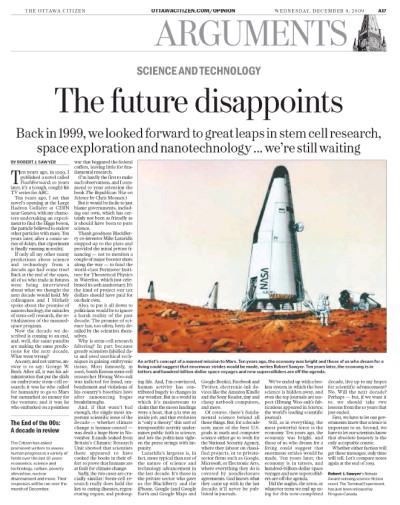Op-ed piece in today's Ottawa Citizen: Science decade in review

Today's (Wednesday, December 9, 2009) Ottawa Citizen -- the largest-circulation newspaper in Canada's capital city -- contains a commissioned op-ed piece by Robert J. Sawyer entitled "The Future Disappoints," looking back at the progress in science and technology over the last decade.
This is the first of a series of decade-in-review op-eds that will be appearing in the Citizen; I'm honoured to have been asked to kick off the series.
Above is how it appears in today's print edition; you can read the full text (sans italics -- I wish the Citizen would fix that problem on their site!) here.
(An op-ed piece is an opinion piece or essay that appears opposite the editorial in a newspaper -- it's a featured opinion piece by someone other than the newspaper's staff editorial writer.)
And (ahem) I'll just point out the biographical note that appears at the end:
Robert J. Sawyer's Nebula Award-winning science-fiction novel The Terminal Experiment has just been reissued by Penguin Canada.Previous op-ed pieces by me:
- Multitasking and Attention Deficit
- A Bright Idea for Atheists
- Michael Crichton's Blending of Fact and Fiction
- The Private Sector in Space
- Stephen Hawking's Call to Colonize Space
Visit The Robert J. Sawyer Web Site
and WakeWatchWonder.com
Labels: Nonfiction, op-ed



3 Comments:
"All Screens Are Not Created Equal" especially hit home with me. Right now, I'm at work with 10 windows minimized, a government document open on one monitor, and an Internet browser open on the second monitor. Oh, and seven tabs open on the browser. I'm the youngest person at the company and one of the few who did not say no when the company offered certain employees a second monitor. Hell, I'm waiting for the right time to ask for a third.
After years of struggling through homework assignments because I was too busy browsing the Internet on my laptop during class, I became an excellent Googler. In fact, I've considered teaching a class on using a search engine effectively -- thereby cleansing your mind of useless clutter, and not living your life like it's an endless training session for Jeopardy.
Hey, you know what would be a cool gameshow? "Google It," where constants must be the fastest in answering obscure questions using only the Internet-enabled computer in front of them.
I'm hungry.
I don’t share your pessimistic view on science, Rob.
In the I.T field, there was a huge scientific progress. And it’s not just Google, Apple, RIM or DARPA. Take for example supercomputers. Every 11 years sharp, the world’s most powerful supercomputer is 1,000 times stronger than the one 11 years earlier.
http://www.top500.org/lists/2009/11/performance_development
Plans are already laid to build a supercomputer with 100 million cores by 2018.
http://hardware.slashdot.org/story/09/11/16/1849259/100-Million-Core-Supercomputers-Coming-By-2018?from=rss
That means that in 3 or 4 years, the world’s most powerful computer, it will be as powerful as the human brain (in processing power, not software.) 11 years later, it will be 1,000 more powerful, and in 37 years - a billion times stronger than the human brain.
Think mobile phones and internet. If 30 years ago someone would have told you that in 2009, anyone driving, or walking on the street, will have immediate access to all humanity’s knowledge thanks to a devise the size of a Star Trek communicator, would you believe him? Gene Roddenberry predicted these technologies (communicators, talking computers, and automated doors) to be available in the 22nd century.
Stem cell research was deferred by 6 years because of the Bush Administration. (Derived from the religious belief that an embryonic cell has a soul, - even if you believe in souls, this logic is false since this one cell could be split and produce any number of people) – This delay in Stem Cell research is probably responsible for more death than the war in Iraq.
As for Space exploration, you’re right. However, don’t blame only the Republicans. The Democrats equally share the responsibility. The Obama administration spent a trillion dollar to bail out failed financial and auto companies. For this sum, we could have financed the colonization of Mars. It’s interesting that the image on the article shows a spacecraft very similar to the Delta Clipper. That promising project, which could have reduced launching coasts by a factor of 10, was canceled by Bill Clinton.
Anyway, that’s my two cents.
With all due respect, Ron, talking about things that are scheduled to perhaps happen in the future, or citing things that happen every decade (the variant of Moore's law you refer to) hardly rebuts my contention that the first decade of the 21st century was a disappointment.
Post a Comment
Subscribe to Post Comments [Atom]
<< Home